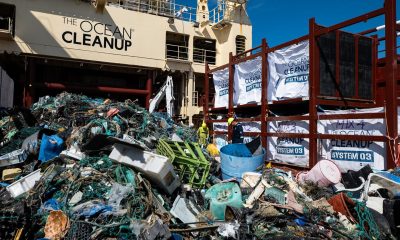News
Shark Week – Fiji: Shark Diving in murky waters (Watch Video)
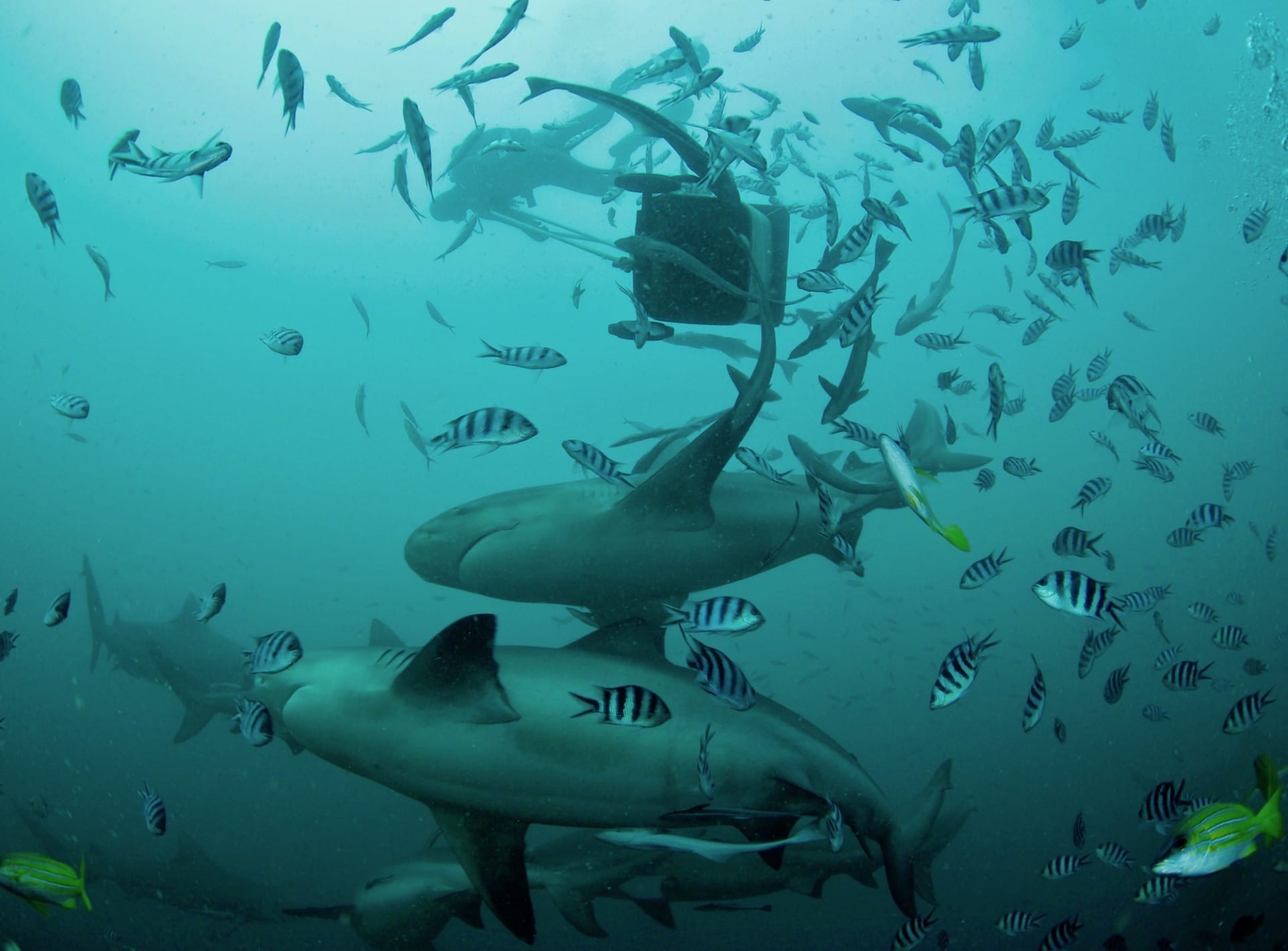
For Shark Week, Scubaverse bloggers CJ and Mike share this great video and their experiences of diving with Bull sharks and more in Fiji…
Murky waters are not what usually come to mind when thinking about diving in Fiji. Unfortunately, we had timed our visit straight after the typhoon in mid-April. Having reached Viti Levu after several days delay, it was only to find that conditions were still too bad on the south coast to do any diving for a couple of days; so we contented ourselves to enjoy the beautiful island and the locals’ fantastic hospitality.
One of the dives we were most looking forward to was the famous Beqa Lagoon shark dive at the Shark Reef Marine Reserve. Being very keen on shark conservation I was interested to see how this operation worked, how it involved local people in the marine reserve and how the proceeds from tourism helped with maintaining a protected area for sharks. Luckily for us the weather settled down after a few days and we were able to book in for a shark dive!
We chose to go with Beqa Adventure Divers and booked to do two shark dives in the morning and an afternoon soft coral dive. We were greeted on arrival by a friendly and efficient front desk team and completed all the necessary paperwork. We then went through to the gear rental and equipment set-up area to get ready to dive. Here we had our only negative experience of the trip, bumping into an extremely rude man, who turned out to be one of the owners! Thankfully our interaction was a brief one and as the rest of the staff possessed the manners and professionalism sadly lacking in their boss, we moved on and did not allow this incident to ruin our whole day.
Once kitted up, our equipment was loaded onto the boat and we met our crew. The boat briefing was very good and the dive briefing thorough, with clear and precise instructions given as to where to go, when, who to follow and how to behave. The divemaster gave us strict instructions on keeping all limbs and cameras to yourself and behind the purpose built walls. The dive plan was well thought out and explained, with the aid of a dive site map. At the site we were told the visibility was likely to be lower than pictures we may have seen and to stay close to the divemaster assigned to you. We were also given a quick shark ID summary and requested to count the sharks we saw by our boat’s marine biologist. With growing excitement we kitted up and jumped in!
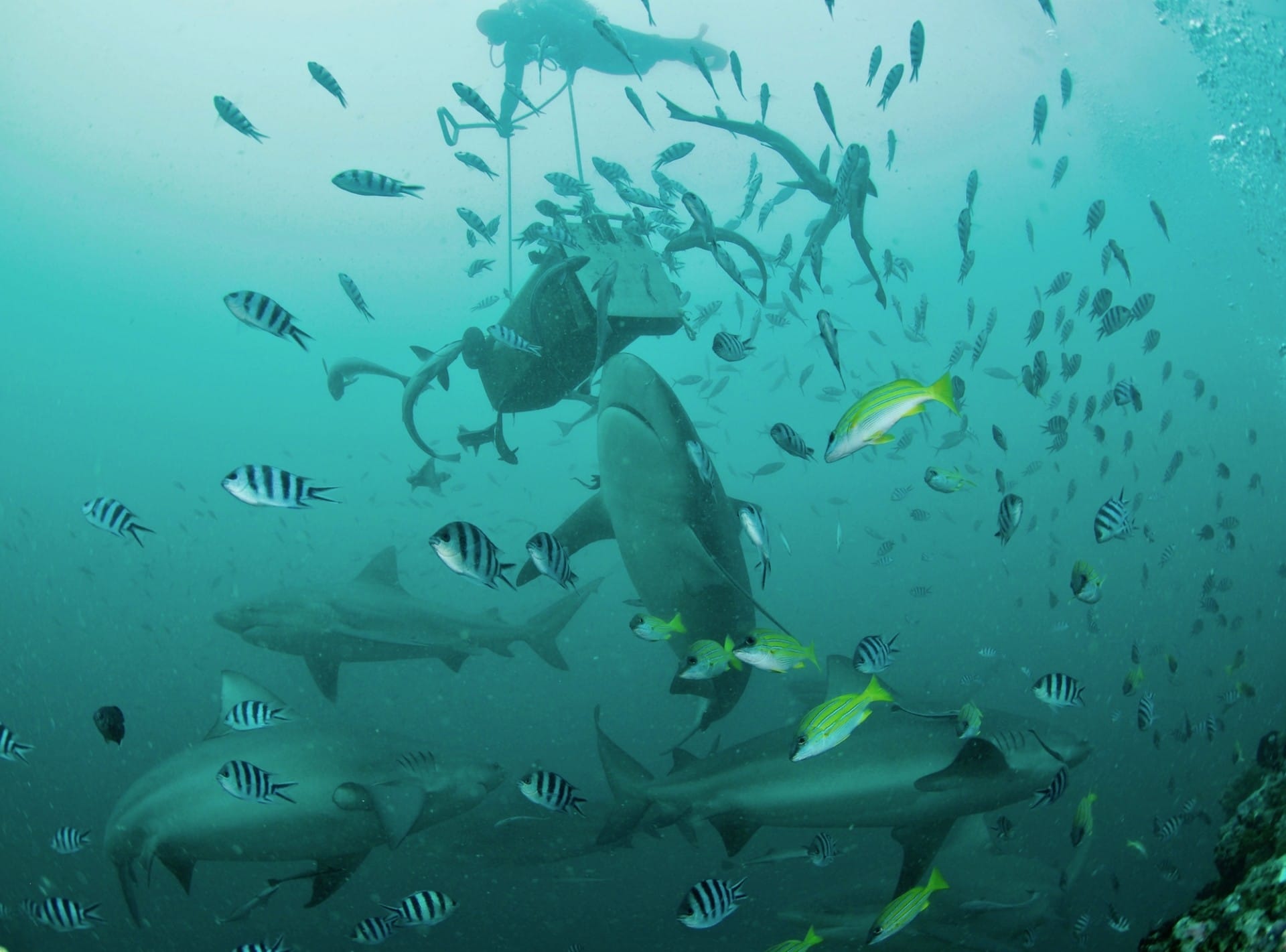
Once in the water we descended with our DM and took up position in front of ‘The Arena’, behind a wall built of coral rubble at 30m. Once all the divers were positioned with DMs at either end and at various points behind us with big poles, the feed began! Another DM swam above us with a wheelie bin full of tuna heads, controlling the position and timing of the dropped food so that as the Bull sharks came in they would chomp up the fish just in front and above our heads, giving a magnificent view of these huge sharks in feeding mode. For 15 minutes huge Bull sharks swam all around us, feeding and cruising past, eyeballing the group. The experience was made all the more atmospheric by the low visibility – dark shadows emerging into oncoming sharks in what felt like the last few metres!
After 15mins at depth we moved up to the next level, 10m for an another 15 minutes, to view Grey, Whitetip and Blacktip Reef sharks, which were fed fish from a smaller container by a DM. The final part of the dive was really an extended safety stop at 5m, with around 10mins to enjoy the reef sharks and abundant fish life at the top of the reef before surfacing.
With everyone buzzing about the dive we were served hot drinks and cookies on the boat, while the marine biologist took data from us, about what sharks we had seen and how many we estimated there were of each species. Apparently today was a quiet day with ‘only’ 20+ Bull sharks (they can get up to 70+ on a busy day!). He then gave us a talk on the shark species we had seen, their behaviours, and some great information about the formation of the marine reserve and their continuing projects and data collection.
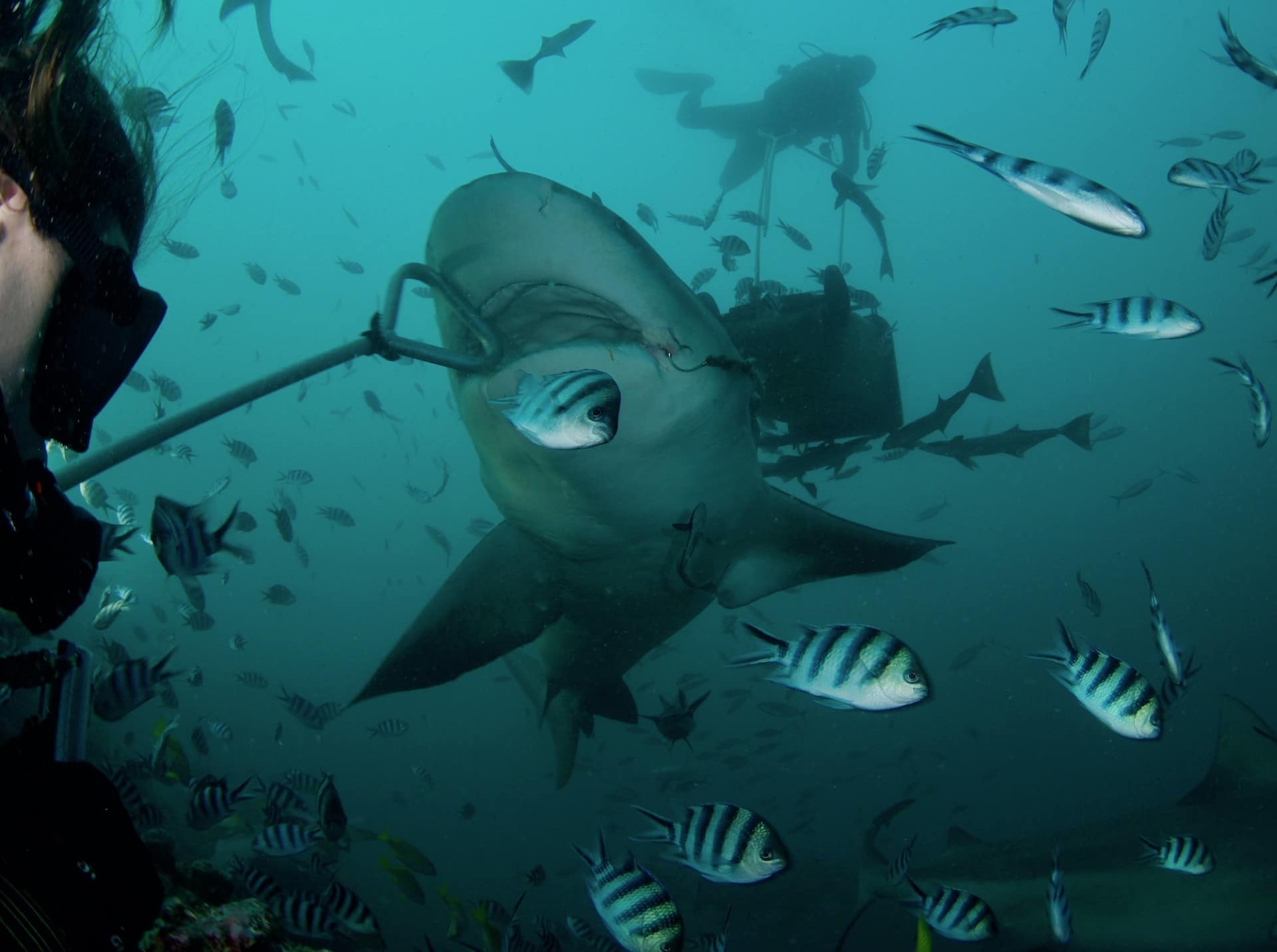
After a lengthy surface interval to off-gas, we headed back in at ‘The Take Out’ to do a 15m dive for 30mins and 5m for 10mins. Here we lay on slabs of rock behind a small wall and had some even closer Bull shark action. The DM behind me occasionally had to bop a shark on the snout if it continued towards us a bit too close, but the sharks seemed very used to the routine and interested only in having a snack of tuna head. The visibility was worse on this dive, adding to the drama, but also making we wish we could experience it again in clear water. After half an hour, which seemed like only minutes with all the stunning sharky action, we headed up to safety stop depth and once again enjoyed the Reef shark feeding.
I didn’t know how I would feel about the shark dive going in, but was prepared to give it a go and I knew I would love seeing sharks in close proximity. Having done the two dive morning, I am very impressed with the set up at B.A.D. Safety wise it is excellent as the very structured dive plan contributes to the high level of control the staff have at all times. The feeding was organised to allow everyone to get a good view and close up action with the sharks, and the high ratio of DMs to divers means the staff have total control of the group and the ability to turn away any shark that gets a little too curious without any drama. Having a multi-level dive also allows divers to see several different species of shark on one dive and extend the dive time.
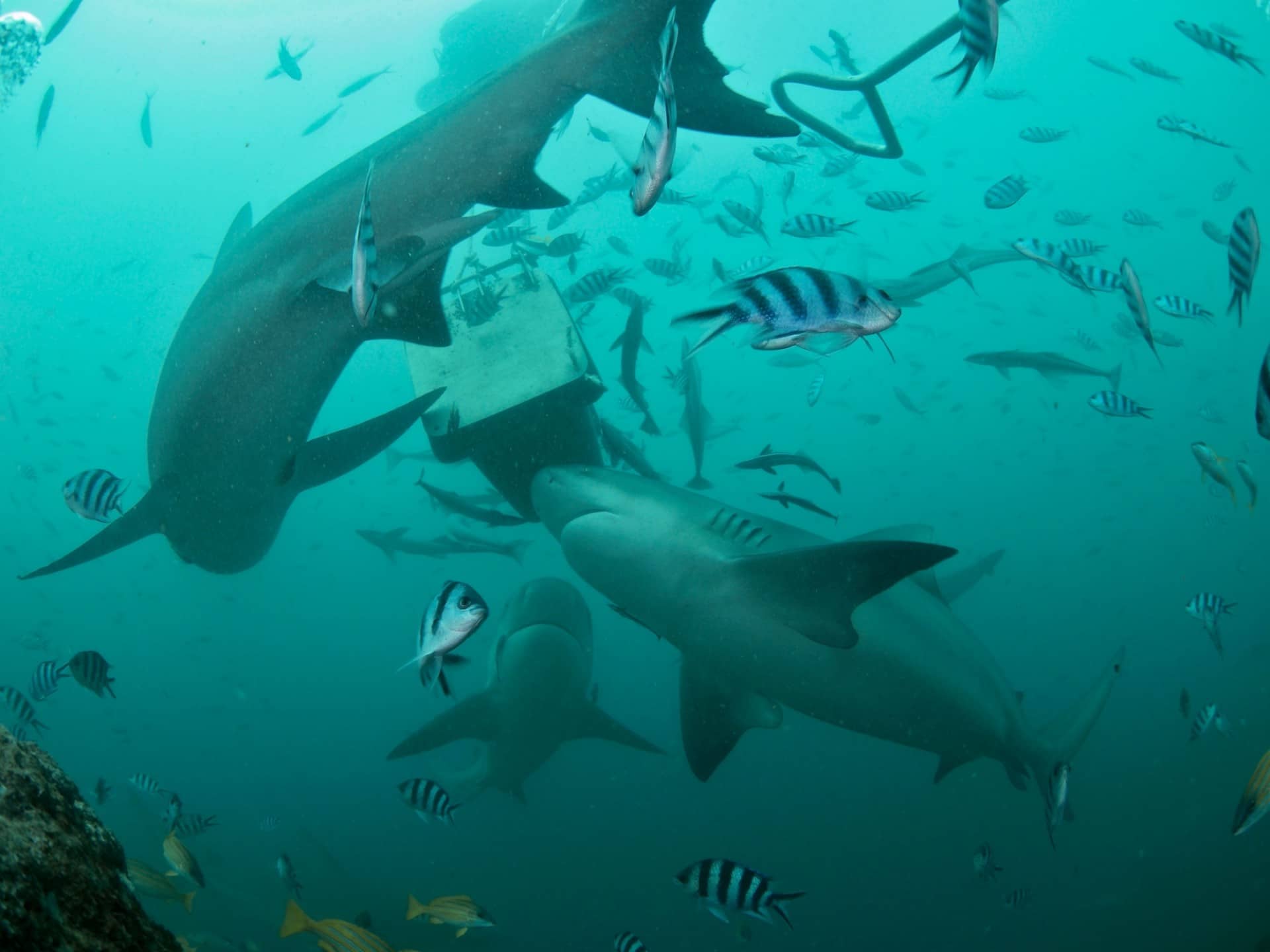
The staff on the boats and in the water were all locals, all of whom were knowledgable, professional and exuded a calm on a boat full of very excited tourists. I was really impressed that they had a marine biologist on each boat to provide info, take data and answer questions. Also we were told that a portion of the money from tourism goes to local communities that have given up their fishing rights in order to create and maintain the marine reserve, which is great news and a good conservation strategy.
Sadly as the weather was worsening and the vis deteriorating, the afternoon dive was called off and so we packed our things and headed off for a good lunch, all that excitement certainly works up an appetite!
On the whole, we had a really good experience with the Fiji Shark Dive in Beqa Lagoon and would recommend it to anyone who wants to see Bull sharks up close. However if you want to do lots of diving and see some of Fiji’s other world class dive sites in all their glory, I would recommend paying high season rates and travelling to Fiji outside of the typhoon season!
Blogs
The Ocean Cleanup Breaks 10,000,000 KG Barrier

The Ocean Cleanup, the global non-profit project, has removed a verified all-time total of ten million kilograms (22 million lbs.) of trash from oceans and rivers around the world – approximately the same weight as the Eiffel Tower.
To complete its mission of ridding the oceans of plastic, The Ocean Cleanup uses a dual strategy: cleaning up the Great Pacific Garbage Patch (GPGP) to remove the plastic already afloat in the oceans, while stopping the flow of plastic from the world’s most polluting rivers.
Through cleaning operations in the GPGP and in rivers in eight countries, the cumulative total of trash removed has now surpassed ten million kilograms. This milestone demonstrates the acceleration of The Ocean Cleanup’s impact, while underlining the astonishing scale of the plastic pollution problem and the need for continued support and action.
While encouraging for the mission, this milestone is only a staging point: millions more tons of plastic still pollute our oceans and The Ocean Cleanup intends to continue learning, improving and innovating to solve this global catastrophe.
This announcement comes as governments from around the world meet to continue negotiations to develop a new legally binding instrument to end plastic pollution at INC4 in Ottawa, Canada. Representatives of The Ocean Cleanup will be in attendance and the organization will be urging decision-makers to collaborate towards a comprehensive and ambitious global treaty which addresses plastic at all stages of its life cycle and in all marine environments worldwide, including in areas beyond national jurisdiction.
It is encouraging to see that the need for remediation is reflected in the various options for potential treaty provisions. It is essential that the final treaty contains clear targets for the remediation of legacy plastic pollution, and reduction of riverine plastic emissions.
Tackling plastic pollution requires innovative and impactful solutions. The treaty should therefore incentivize the innovation ecosystem by fostering innovations that make maximal use of data, technology and scientific knowledge – such as those designed and deployed by The Ocean Cleanup.
‘After many tough years of trial and error, it’s amazing to see our work is starting to pay off – and I am proud of the team who has brought us to this point.’ said Boyan Slat, Founder and CEO of The Ocean Cleanup. ‘While we still have a long way to go, our recent successes fill us with renewed confidence that the oceans can be cleaned.’
The Ocean Cleanup was founded in 2013 and captured its first plastic in 2019, with the first confirmed catch in the GPGP coming soon after the deployment of Interceptor 001 in Jakarta, Indonesia. After surpassing one million kilograms of trash removed in early 2022, the non-profit project has since progressed to the third iteration of its GPGP cleaning solution, known as System 03, and a network of Interceptors currently covering rivers in eight countries, with more deployments set for 2024.
About The Ocean Cleanup
The Ocean Cleanup is an international non-profit organization that develops and scales technologies to rid the world’s oceans of plastic. They aim to achieve this goal through a dual strategy: stemming the inflow via rivers and cleaning up the legacy plastic that has already accumulated in the ocean. For the latter, The Ocean Cleanup develops large-scale systems to efficiently concentrate the plastic for periodic removal. This plastic is tracked and traced through DNV’s chain of custody model to certify claims of origin when recycling it into new products. To curb the tide via rivers, The Ocean Cleanup has developed Interceptor™ solutions to halt and extract riverine plastic before it reaches the ocean. Founded in 2013 by Boyan Slat, The Ocean Cleanup now employs a broadly multi-disciplined team of approximately 140. The foundation is headquartered in Rotterdam, the Netherlands.
For more information, visit: theoceancleanup.com and follow @theoceancleanup on social media.
Marine Life & Conservation
Steve Backshall to headline Shark Trust’s flagship event: For the Love of Sharks

Join a host of amazing, shark loving, speakers including Steve Backshall and the Shark Trust team for an evening celebrating shark conservation at the Royal Geographical Society in London this November.
Date: 29th November 2024
Time: 6-10pm
Location: Royal Geographical Society, London
Tickets: https://www.sharktrust.org/Event/flos24
The event will be a celebration of all things shark. Those lucky enough to get hold of tickets will hear from engaging guest speakers with a passion for sharks.
The line-up includes (*subject to change if unforeseen circumstances arise)
Steve Backshall: One of television’s busiest presenters, BAFTA award-winning wildlife expert Steve has been passionate about the wild world ever since he was young.
Steve’s impressive TV career has taken him all around the world, investigating a wide array of species and environments. Steve has filmed over 100 hours of children’s wildlife programmes with the BAFTA award winning Deadly 60 franchise and recently, with Sky Nature, for his new series ‘Whale with Steve Backshall’. He has been a patron for the Shark Trust for 10 years.
Simon Rogerson: is a photojournalist specialising in natural history, diving and the sea.
He is editor of SCUBA magazine, the official journal of the British Sub-Aqua Club. Simon started his career as a crime reporter but gravitated towards his ‘less depressing’ interest in underwater exploration, joining the staff of DIVE magazine in 1999. In 2005 he was named ‘Editor of the Year’ in the PPA’s Independent Publishing Awards. Simon also works as a freelance writer, contributing frequently to the Sunday Times and Telegraph, in addition to BBC Wildlife, Esquire, and a host of international diving magazines. He is the author of a book, Dive Red Sea, published by Ultimate Sports. Now based in Berkshire, Simon has been a Patron of the Shark Trust for 20 years.
More speakers to be announced soon. Head to the Shark Trust website to learn more.
The evening will also allow guests the final chance to see the Oceanic 31, shark art exhibition. Some of the artwork will be auctioned/raffled at the event, while the rest will be auctioned online to raise money for the Shark Trust Oceanic Programme.
For the Love of Sharks is an evening with something for everyone who is interested and fascinated by sharks. Join the Shark Trust, their Patrons, Trustees and Staff, along with a host of supporters for this celebration of shark conservation.
For more information or to buy a ticket: https://www.sharktrust.org/Event/flos24
-

 News3 months ago
News3 months agoCapturing Critters in Lembeh Underwater Photography Workshop 2024: Event Roundup
-

 Marine Life & Conservation Blogs3 months ago
Marine Life & Conservation Blogs3 months agoCreature Feature: Swell Sharks
-

 Blogs2 months ago
Blogs2 months agoMurex Resorts: Passport to Paradise!
-

 Blogs2 months ago
Blogs2 months agoDiver Discovering Whale Skeletons Beneath Ice Judged World’s Best Underwater Photograph
-

 Gear Reviews3 weeks ago
Gear Reviews3 weeks agoGEAR REVIEW – Revolutionising Diving Comfort: The Sharkskin T2 Chillproof Suit
-

 Gear Reviews3 months ago
Gear Reviews3 months agoGear Review: Oceanic+ Dive Housing for iPhone
-

 Marine Life & Conservation2 months ago
Marine Life & Conservation2 months agoSave the Manatee Club launches brand new webcams at Silver Springs State Park, Florida
-

 News2 months ago
News2 months agoPADI Teams Up with Wellness Brand Neuro to Drive Ocean Change and Create a Blue State of Mind



